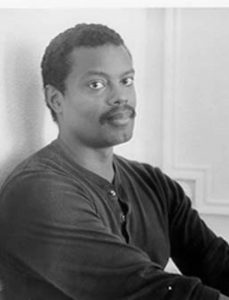
Melvin Dixon
*Melvin Dixon was born on this date in 1950. He was a Black Gay Professor of Literature and an author, poet, and translator.
He wrote about Black gay men. Melvin Dixon was born in Stamford, Connecticut. Although he was born and raised in the Northeast, his parents were from the South. Dixon acquired an uncanny ability to blend the vernacular language of the American South with intellectual eloquence, tapping the wells of both the Black oral tradition and the sophistication of his university training to create powerfully resonant prose and poetry that ultimately transcend each of those categories.
He earned a BA from Wesleyan University in 1971 and a Ph.D. from Brown University in 1975. In the late 1970s, Dixon began publishing in magazines with limited circulation, such as the Beloit Poetry Journal and chapbooks. At the same time, Dixon became an accomplished scholar, receiving numerous academic awards, including a Ford Foundation Postdoctoral Fellowship and a Fulbright Lectureship in Senegal. His book of literary criticism, Ride Out the Wilderness: Geography and Identity in African American Literature (1987), opens with a discussion of slave songs and narratives and examines the work of ten African American novelists.
He was the author of several books. In 1989, Trouble the Water won the Charles H. and N. Mildred Nilon Excellence in Minority Fiction Award. Vanishing Rooms won a Ferro-Grumley Award for LGBT Literature in 1992. Dixon's style is not only deeply rooted in his African American heritage, but his writing also evokes a sense of history and tradition grounded in family. His first poetry book, Change of Territory (1983), and his first novel, Trouble the Water (1989), explore the common themes of finding oneself through a sense of connectedness with one's history. These works explore the concept of the prodigal son from the point of view of the returned man who must confront the demons in his past to understand himself. The homecoming theme resounds throughout Dixon's work as a metaphor for sexual acceptance. Gay issues are more explicitly explored in Vanishing Rooms (1991), which features a brutal gay-bashing incident and a complexly layered interracial gay love affair.
In 1991, he published his translation (from French) of The Collected Poems of Léopold Sédhar Senghor, the poet and one-time Senegalese president. Dixon's final volume of poetry, Love's Instruments (1995), addresses his living experience with AIDS. One of the poems in the collection, "Aunt Ida Pieces a Quilt," explains how a dead man's garments are gathered to be included in his grandmother's contribution to the AIDS Memorial Quilt. This nostalgic description of the traditional African American woman's craft, juxtaposed with the modern reality of loss, lies at the heart of Dixon's work. Rather than standing apart from the experience of being African American because of his sexuality, Dixon embraced his community and demanded that his community embrace him in return. He was a Professor of Literature at Queens College from 1980 to 1992.
At forty-two, Melvin Dixon died on October 26, 1992, from an AIDS-related illness. Because of his early death, Dixon's output was relatively small, yet it is essential to a complete understanding of the African American gay experience.